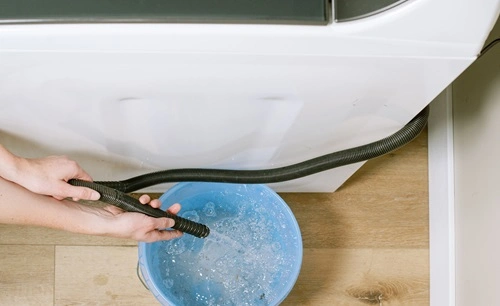Yes, in most areas of the United States, it is illegal to drain a washing machine outside due to environmental and public health concerns. Federal, state, and local laws regulate the disposal of wastewater, and improper drainage can result in fines and legal consequences. However, there are some exceptions in rural or unincorporated areas where local regulations may allow such practices under specific conditions.
Legal Framework for Wastewater Disposal
1. Federal Laws and Guidelines
- The Clean Water Act (CWA) prohibits discharging pollutants, including soapy water from washing machines, into surface water or storm drains without a proper permit.
- Washing machine water, classified as graywater, contains detergents, oils, and other chemicals that can harm the environment.
2. State Regulations
States often adopt additional laws based on their environmental concerns. For example:
- California: Requires all wastewater, including graywater, to be discharged into a septic system or sewer system unless it’s part of an approved graywater reuse system.
- Texas: Allows outdoor discharge of graywater under strict guidelines, such as avoiding contact with surface water and preventing public health risks.
3. Local Ordinances
Cities and counties often have their own wastewater management rules. Urban areas typically prohibit outdoor drainage due to the risk of contaminating stormwater systems, while rural areas may offer leniency.
Why Draining a Washing Machine Outside Is Often Illegal
1. Environmental Impact
- Washing machine water contains detergents, fabric softeners, and microplastics that can contaminate soil, groundwater, and nearby water bodies.
- Improper drainage can lead to algae blooms, which deplete oxygen in water systems and harm aquatic life.
2. Public Health Concerns
- Graywater can carry bacteria, grease, and chemicals that pose health risks to humans and animals.
- Improper drainage increases the likelihood of exposure to harmful pathogens, especially in densely populated areas.
3. Violation of Stormwater Management
In many municipalities, storm drains are designed to handle rainwater, not wastewater. Draining washing machine water into these systems can overload them and lead to pollution.
Permitted Uses of Graywater
1. Graywater Systems
- Some jurisdictions allow graywater to be reused for specific purposes, such as irrigation, provided it complies with local health and safety guidelines.
- Approved graywater systems often include filtration and distribution components to minimize environmental risks.
2. Rural Exceptions
In certain rural areas, outdoor drainage may be allowed if it does not pose an environmental hazard or violate state and local laws. However, the area must meet specific conditions, such as sufficient distance from wells, streams, or neighbors’ properties.
3. Septic System Integration
Graywater can be legally drained into a septic system or municipal sewer if done in compliance with plumbing codes.
Consequences of Illegal Drainage
1. Fines and Penalties
Violating wastewater disposal laws can result in fines ranging from $500 to $5,000, depending on the severity of the infraction and local regulations.
2. Environmental Cleanup Costs
In cases of significant environmental damage, violators may be held liable for cleanup costs.
3. Legal Action
Repeated offenses or severe violations can result in legal action, including lawsuits from neighbors or enforcement by environmental agencies.
Best Practices for Managing Washing Machine Wastewater
1. Install a Graywater System: A properly installed graywater system can reuse washing machine water for non-potable purposes, such as irrigation.
2. Connect to a Sewer or Septic System: Ensure your washing machine drains into an approved sewer or septic system to comply with local regulations.
3. Consult Local Authorities: Before attempting outdoor drainage, check with your local health or environmental department to ensure compliance with regulations.
Related FAQs
Q1. Can I drain my washing machine into my yard?
Ans: Generally, no. Most local laws require washing machine water to be discharged into a sewer or septic system. Some rural areas may allow yard drainage with restrictions.
Q2. Is washing machine water considered graywater?
Ans: Yes, washing machine water is classified as graywater because it comes from domestic activities like laundry, but it still contains contaminants.
Q3. Can I use washing machine water for irrigation?
Ans: Yes, but only if it’s part of an approved graywater system designed to filter and safely distribute the water. Directly draining it onto plants or lawns without treatment is typically not allowed.
Q4. What are the penalties for illegal drainage?
Ans: Penalties can include fines, legal action, and liability for environmental damage, with fines often ranging from $500 to $5,000.
Q5. Do I need a permit for a graywater system?
Ans: In most cases, yes. Local authorities often require permits to ensure the system meets safety and environmental standards.
Conclusion
Draining a washing machine outside is illegal in most jurisdictions due to environmental and public health concerns. While exceptions exist for rural areas or approved graywater systems, compliance with federal, state, and local regulations is essential. Homeowners should explore legal options, such as connecting to a septic system or installing a graywater reuse system, to manage washing machine wastewater responsibly.

